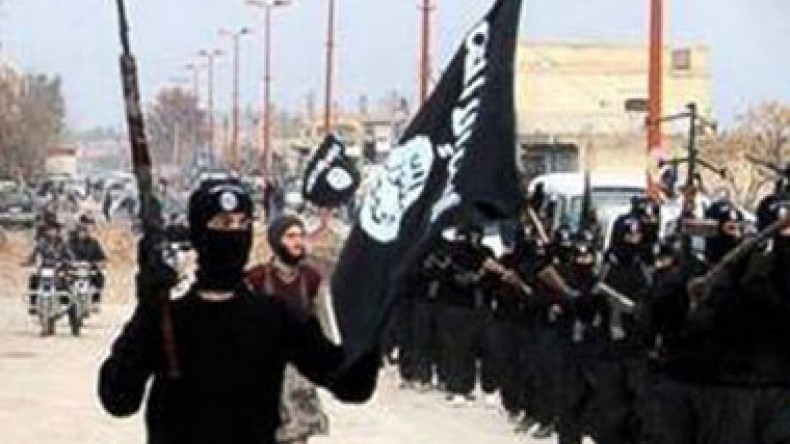
Azerbaijan President’s former security guard headed radical terrorist group in Syria
Azerbaijani President’s former bodyguard headed one of the radical terrorist groups in the territory of Syria, said Zhabrayil Tsoltsayev (name is changed), a Chechen who had fought for so-called “Sasitlin squad” in one of the military units of the group “Jaish al-Muhajireen wal-Ansar”, according to the newspaper Novaya Gazeta.
The Chechen said he started to talk with his friends, who fight for the Syrian armed opposition, in late February 2013 in the social networks Odnoklassniki and VKontakte. “I asked them to organize my departure, so that I could take part in Jihad. On their instruction, I had an international passport issued, packed my things and money. On 15 July, I left for Baku and flew to Turkey. I got in touch with my friends. They sent their people to meet me and take me to the Syrian border. A conductor met me there, and after an hour of walking, we reached the town of Atma where the headquarters of the group “Jaish al-Muhajireen wal-Ansar” was situated. The group’s leader is our fellow-countryman, Amir Abu Umar al-Shishani (Omar the Chechen),” he said.
The next morning, he was taken to a military training camp in the settlement of Sheikh Suleiman, a former Syrian military base in mountainous area taken by the rebels, Tsoltsayev said.
“We mainly focused on the physical training. An Azerbaijani nicknamed ‘Khattab’ was our instructor. Generally, the military instructors were Azerbaijanis. The camp warden was Khazma, an Azerbaijani. He used to be the bodyguard of the Azerbaijan’s president Aliyev. There was a physician in the camp, a Russian, who gave first aid lessons for gunshot wounds. Every day we took part in forced marches over rough terrain, had shooting lessons from large-caliber arms like howitzers, DShKs. We learned to drive tanks and shoot from them,” he said.
According to the Chechen, 250 to 300 people were being trained in the camp. The trainings took from 25 to 30 days. Their subdivision was involved in the seizure of the Minnigh airport on 30 August 2013, and in October 17 fight against Bashar al-Assad’s government troops in the town of Al-Sukhna. “In total, our group lost about 60 people as a result of the two operations. After that, I returned to the base ‘Rif-Maundisin’, departed to Istanbul and came back to Russia via Azerbaijan,” he said.
Azerbaijani news portal Haqqin.az reports that “Khamza” was more than once referred to during the trial against the Azerbaijanis who had returned from Syria. “They all claimed unanimously that he is highly respected and is actually the head of the radical group. The former militant Elshan Gurbanli said during the trial that the celebrated Khamza’s real name is Ramil Ali oglu Fataliyev. The instructor nicknamed ‘Khattab’ is Dayanat Adalyat oglu Yadigarov,” Haqqin.az writes.
The Azerbaijani terrorists have long been fighting in the ranks of various terrorist groupings in Syria, Afghanistan and Pakistan. The Azerbaijani media reported about the death of about 200 Azerbaijani terrorists only in Syria over the past three years. There have also been frequent media reports about Azerbaijani terrorist commanders’ liquidation.
Azerbaijan has recently increased pressure on the religious activists and communities that are suspected of ties with Wahhabis. According to some opinions, the Salafists who joined the Islamist groups in Syria and returned to Azerbaijan with fighting experience can target Ilham Aliyev’s government.
The relationship between international terrorist groups and Azerbaijan originated in the early 1990s. That time, the Azerbaijani army, having failed in the aggression against Nagorno-Karabakh Republic (NKR), retreated with losses. Trying to save the situation, the Azerbaijani leadership, headed by Heydar Aliyev attracted to the war against the Armenians of Nagorno-Karabakh international terrorists and members of radical groups from Afghanistan (groupings of Gulbuddin Hekmatyar), Turkey ("Grey Wolves", etc.), Chechnya (groupings Basayev and Raduyev etc.) and some other regions.
Despite the involvement of thousands of foreign mercenaries and terrorists in the Azerbaijani army during the war, the Azerbaijani aggression against Nagorno-Karabakh Republic failed, and the Baku authorities were forced to sign an armistice with the NKR and Armenia. However, international terrorists established ties in Azerbaijan, and used them in the future. The Azerbaijanis were recruited and sent to Afghanistan and the North Caucasus, where they participated in the battles against the forces of the international coalition and Russian organizations.
Related:
Azerbaijani creates entrepot for ‘Islamic State’ militants in Turkey
American political scientist: Western Intelligence used Azerbaijan to export terrorism into Russia
Newsfeed
Videos






























